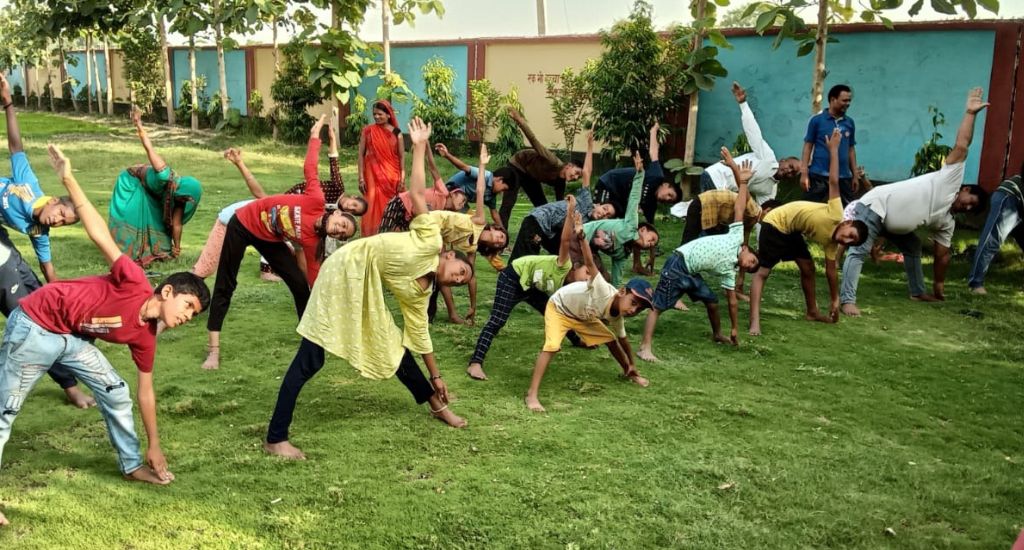
Summer camp for kids ensures learning beyond books
Members of a women’s collective and school teachers work together to organise a summer camp in Bhawanipur village of Uttar Pradesh, to help children gain holistic knowledge.

Members of a women’s collective and school teachers work together to organise a summer camp in Bhawanipur village of Uttar Pradesh, to help children gain holistic knowledge.
With the mercury touching 44°C, the summer months in Bhawanipur are all about people eagerly waiting for the monsoon to arrive. The farmers of this village in Varanasi district of Uttar Pradesh are busy with the preparatory work in their fields.
It is the kharif crop that usually helps the rural economies thrive. It is also a busy time for the women as they are actively involved in farm work. Whether it is seed treatment or sowing of paddy seeds, the women are hands-on farmers. But it is also the time for them to get their children ready so they can go back to school with enthusiasm after a long summer vacation.

But this time the women had something new to do, which was different from their everyday chores at home and agricultural fields. It was to make sure that the children of the village attended the summer camp and benefitted from it.
At Transform Rural India Foundation (TRIF), we came up with the idea of organising a summer camp for the children, and also of involving the community in implementing it.
First, we mooted the idea of a summer camp with the women’s collectives in the village organisation named Roshni Mahila Gram Sangthan. Women’s collectives have the potential of heralding change in a community steeped in traditions.

The women’s collectives open-heartedly welcomed the idea of a summer camp, and assured us of their full support. This was followed by interactions with the head teacher and assistant teachers of Poorva Madhyamik Vidyalay, a school at Bhawanipur in the Araji Lines administrative block.
Also Read | Teaching beyond the textbooks in Rajasthan
A comprehensive framework, including the purpose, activities and processes of the summer camp, was established.
The enthusiasm and eagerness of the members of the women’s collective in organising the summer camp were unmatched, as they fully understood the importance of learning and education. They mobilised the villagers and also made sure that the children attended the camp regularly on all days.
The village organisation also provided its space for the camp. When necessary, the school not only provided full use of classrooms and the open grounds, but also resources like television, sound system, etc.

Though the teachers were still on their summer vacation, they came for the camp so that they could support the TRIF team’s activities. Teachers from Bhawanipur Poorva Madhyamik School came and took part in the camp.
Various activities were organised during the camp, ranging from art and craft, dance, yoga and screening of children’s films to discussions on sensitive issues like good touch and bad touch during adolescence. Members of the TRIF team served as the resource persons for the activities. The teachers pitched in wherever they could.
The Yashpal Committee report of 1993 on the concept of learning without burden had suggested that education committees should be constituted at the village, block and district levels. But these suggestions were not fully implemented.
Mahatma Gandhi had said, “By education, I mean all-around drawing out the best in child and man – body, mind and spirit. Literacy is not the end of education, not even the beginning. It is one of the means whereby men and women can be educated. Literacy in itself is no education.”
Also Read | An educator and his rural school with a difference

The Nation Curriculum Framework 2005 has also adopted learning models based on the surroundings, and on ‘learning by doing’. It lays emphasis on the idea that in the local context, education is about learning based on local knowledge and available resources, and that community is one of the best sources for them.
The Nation Curriculum Framework 2023 proposes: “Schools need to plan their whole academic year at the beginning through an annual school calendar. This should include PTMs…summer camps, etc. Alignment with important dates as shared by the education department and local community level engagements is also necessary.”
If the women’s collectives organise such events, it will serve the real purpose of education. Such initiatives will not only broaden the horizons of learning but also lead to other villages introducing similar kinds of learning methods.

In rural areas, education leads the way towards change. It is essential to introduce new platforms for joyful learning. We hope that the new Curriculum Framework 2023 will inculcate this idea and lead to on-ground implementation.
The children of Bhawanipur expressed their joy as this was the first time such a summer camp had been organised for them. It endorses the idea of ’for the community (people), by the community (people) and to the community’ enshrined in the Constitution of India.
Recognising the importance of such means of gaining knowledge, a key member of the community suggested sustaining it with the help of the school management committee. The office bearers of the village organisation committed to participating in school management committee meetings regularly.
Also Read | Accessible education for deprived rural students

According to one of the members of the village organisation, such camps will be beneficial for the physical and mental health, and overall development of the children. The community plans to take this forward.
7.jpg: The lead image at the top shows a physical fitness session being held at the summer camp at Bhawanipur in the Araji Lines administrative block of Uttar Pradesh. (Photo by Mofid Alam)
Mirza Ayaz Beg is a development professional and researcher currently associated with Transform Rural India Foundation. He writes about developmental and policy related topics.